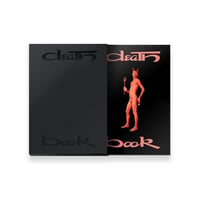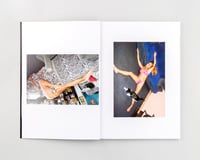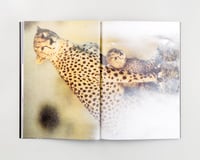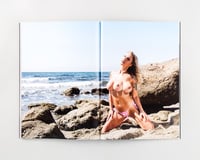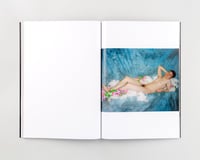DEATH BOOK I BY MATTHEW HOLROYD
Published by Baron
20 x 27 cm
Softcover in slipcase
November 2018
Edited and published by Matthew Holroyd, the founder of Baron and Baroness Magazines, and photographer Edith Bergfors, the death book is a series of loosely connected vignettes exploring photography’s relationship to death and how death is portrayed in Western society.
A photograph typically captures a moment in the past, bringing it to the present. In contemporary surveillance culture (a.k.a the internet), the dead and alive exist side by side. On the satellite mapping site Google Earth, for example, Bergfors has sourced photographs of her now-deceased grandparent's gardening. Likewise, as a genre, portraiture tends to circle around mortality, desire, and power. Through extensive Photoshop manipulation, the editors of this book present themselves as thinned down, airbrushed, and clad in designer fashions, in an attempt to be remembered as rich and picture-perfect. Sadly, The National Portrait Gallery, London, rejected their attempts to bequeath these portraits to the nation.
Popular representations of death act as simulations of death, rather than representations of any reality. For example, the devil has come to signify a host of mortal sins – from drinking to sex. Playing on this legacy, here a rent boy is portrayed as the devil, alongside muscular clubbers exhibiting their sporty physique.
The book also contains contributions from image-makers and other visual practitioners who have informed the editors’ own ideas on death; these include Palm d’Or-winning director Lars von Trier, Golden Lion-winning director Roy Andersson, Turner Prize-winner Damien Hirst, a letter from the musician Merle Allin to the serial killer Danny Rolling, conceptual artist Manabu Yamanaka, the documentary photographer Miron Zownir, conceptual artist Dallas Seitz and crime scene simulator Bill’s Playhouse.
In a time where a digital version of almost anything is possible, the advantage of being able to upload a posthumous video for loved ones to watch is now a possibility. Bergfors and Holroyd recreate such films and the book ends with two QR codes for anyone to scan and watch, just like a supermarket barcode.

